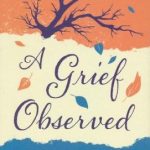Book Review – A Grief Observed
[A Grief Observed, C.S. Lewis, 1961 by C.S. Lewis Pte Limited, published by HarperCollins Publishers, ISBN 978-0-06-065238-8]
Though (mostly) not dealing specifically with child or pregnancy loss, there were some quotes that, after hearing them on audio, drove me to read the book, A Grief Observed, for myself. I encourage you to consider the same. Humor and pardon me as I personalized some of the quotes [with changes made in brackets].
Page 47, “It’s not true that I’m always thinking of [him]. Work and conversation make that impossible. But the times when I’m not are perhaps my worst. For then, though I have forgotten the reason, there is spread over everything a vague sense of wrongness, of something amiss…. the atmosphere, the taste of the whole thing is deadly…. What’s wrong with the world to make it so flat, shabby, worn-out looking? Then I remember.”
Pages 72-73, “…summoned me into a past kind of happiness, my pre-[pregnancy]. happiness. But the invitation seemed to me horrible. The happiness into which it invited me was insipid. I find that I don’t want to go back again and be happy in that way. It frightens me to think that a mere going back should even be possible. For this fate would seem to me the worst of all; to reach a state in which my . . . love . . . should appear in retrospect a charming episode—like a holiday—that had briefly interrupted my interminable life and returned me to normal, unchanged. And then it would come to seem unreal—something so foreign to the usual texture of my history that I could almost believe it had happened to someone else. Thus [he] would die to me a second time; a worse bereavement than the first. Anything but that.”
Page 28, “I have no photograph of… [him] that’s any good…. But…[his] voice is still vivid. The remembered voice—that can turn me at any moment to a whimpering child.” [Read Isaac’s Personhood Story]
Continue reading...
Pages 77-78, “It doesn’t matter that all the photographs of…[him] are bad. It doesn’t matter—not much—if my memory of. . .[him] is imperfect. Images, whether on paper or in the mind, are not important for themselves. Merely links….is it not in some ways an advantage—that it can’t pretend the least resemblance to that which it unites me?
I need Christ, not something [the bread and wine of communion] that resembles Him. I want…[him], not something that is like…[him]. A really good photograph might become in the end a snare, a horror, and an obstacle.
Images, I must suppose, have their use or they would not have been so popular. (It makes little difference whether they are pictures and statues outside the mind or imaginative constructions within it.) . . .
And this, not any image or memory, is what we are to love still, after. . .[he] is dead.”
Pages 38-39, “And poor C. quotes to me ‘Do not mourn like those that have no hope.’ It astonishes me, the way we are invited to apply to ourselves words so obviously addressed to our betters. What St. Paul says can comfort only those who love God better than the dead, and the dead better than themselves. If a mother is mourning not for what she has lost but for what her dead child has lost, it is a comfort to believe that the child has not lost the end for which it was created. And it is a comfort to believe that she herself, in losing her chief or only natural happiness, has not lost a greater thing, that she may still hope to ‘glorify God and enjoy Him forever.’ A comfort to the God-aimed, eternal spirit within her. But not to her motherhood. The specifically maternal happiness must be written off. Never, in any place or time, will she have her son on her knees, or bath him, or tell him a story, or plan for his future, or see her grandchild.” [Read The Importance of Validation]
And, to personalize from A Grief Observed this last sentiment so eloquently expressed in grief over child loss: “[My] specifically maternal happiness must be written off. Never…will [I] have [my] son on [my] knees, or bathe him, or tell him a story, or plan for his future, or see [my] grandchild.”